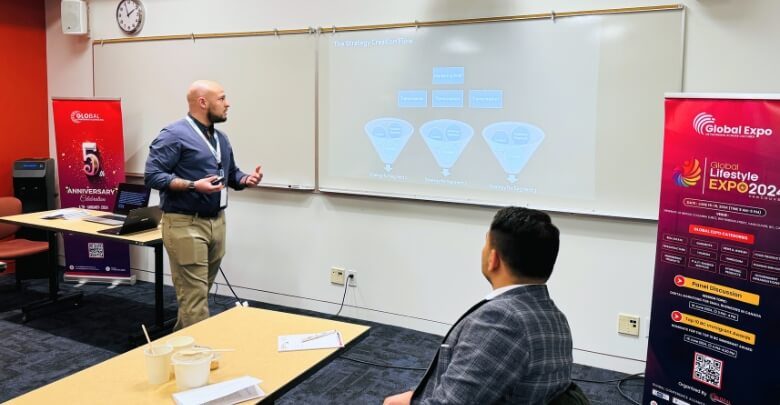The desire to share your expertise, inspire others, and make a meaningful impact is a noble pursuit. But let’s face it: while the emotional rewards of speaking engagements are enriching, you’re also interested in earning money for your time and talent. You may find yourself asking: How do I get started as a paid speaker?
The journey involves more than just a gift for gab; it’s a structured approach that requires preparation, agility, and strategy.
Fortunately, this article will guide you through the essential steps, from developing compelling content to building a professional portfolio, that will make organizations eager to have you speak and pay you for it. So, if you’re ready to turn your wisdom into revenue, read on.
General Overview of Paid Speakers
Paid speaking engagements offer a unique avenue for professionals to share expertise and generate income. Participating in conferences featuring prominent speakers allows attendees to gain insights from experts, thought leaders, or motivational figures who have cultivated specialized knowledge. They get hired to share this knowledge at conferences, seminars, and corporate events, enriching audiences while earning a fee.

Financial compensation for speakers varies significantly depending on reputation, expertise, and demand. Some well-established figures command tens of thousands of dollars for a single engagement. However, even those starting can make a respectable income as they build their portfolio and network.
From a career standpoint, paid speaking offers more than just monetary rewards. It serves as a platform for personal branding, allows for networking at a high level, and often leads to other opportunities like consulting gigs, book deals, or media appearances. It’s a multifaceted career with extensive reach and influence.
Essential Factors Required to Become a Paid Speaker
Becoming a paid speaker is a rewarding journey that requires more than just the gift of the gab. Here are five essential factors you’ll need to master to turn your speaking engagements into paid opportunities.
Master Your Content
First, expertise in your chosen field is crucial. Your audience wants valuable insights, not generic fluff. In-depth knowledge allows you to provide a unique perspective that sets you apart.
Invest in Presentation Skills
Knowing your subject is just the starting point. You also need to captivate your audience. Effective communication, body language, and storytelling techniques are essential for this.
Build a Strong Portfolio
A portfolio showcases your experience and competence. Include video clips of your talks, client testimonials, and a list of past engagements. Make it easily accessible online to attract event organizers.
Network Relentlessly
Connections can fast-track your career. Attend industry events, engage with decision-makers on social media, and join professional speaking associations. Whether it’s a local seminar or an international conference in Canada, the UK, or the USA, every event is an opportunity to make valuable connections and land your next gig.
Adopt a Business Mindset
Being a paid speaker is essentially running a small business. Understand your market value, develop marketing strategies, and manage finances carefully. Professionalism in business dealings amplifies your chances of getting hired repeatedly.
By focusing on these crucial elements, you’re well on your way to becoming a sought-after, paid speaker.
How Do You Get Started as a Paid Speaker?
Embarking on a journey to become a paid speaker is both exciting and challenging. Follow this step-by-step guide to transition from an aspiring orator to a well-compensated speaker.
Step 1: Identify Your Niche
Your first task is to pinpoint the topic you are passionate about and knowledgeable in. Selecting a niche makes it easier to position yourself as an expert. Your specialized focus will attract organizers looking for speakers in that domain.
Step 2: Hone Your Craft
Being an expert in a field doesn’t automatically make you a great speaker. Take courses on public speaking, watch seasoned speakers, and practice constantly. Becoming a compelling orator requires both skill and preparation.
Step 3: Create Compelling Content
Your speeches should not only inform but also inspire. Work on crafting engaging presentations that resonate with your target audience. Use stories, data, and visuals to make your points memorable.
Step 4: Build a Portfolio
As you gain experience, compile a portfolio showcasing your best work. This should include video clips, testimonials, and a list of past speaking engagements. A robust portfolio is often your best sales tool.
Step 5: Market Yourself
You can’t just wait for opportunities; you have to seek them out. Build a professional website, harness social media, and network at industry events. Your visibility online and offline is crucial for getting booked.
Step 6: Set Your Rates
Understand your value in the market to set appropriate speaking fees. It’s okay to start modestly, but as you build your reputation, don’t hesitate to raise your rates. Your time and expertise are valuable assets.
Step 7: Engage with Organizers
The final step involves direct outreach to event organizers or responding to speaking opportunities. Craft a persuasive pitch and follow up diligently. Persistence often pays off in landing those lucrative speaking gigs.
By systematically following these steps, you’ll be well on your way to establishing a successful career as a paid speaker.
How Much Do Different Types of Speakers Get Paid?
The speaking industry is diverse, with different categories of speakers earning various amounts depending on their expertise and market demand. Numerous factors like reputation, audience size, and the nature of the event influence financial compensation.
Motivational Speakers
Motivational speakers are often in high demand and can command respectable fees. Newcomers might earn around $1,000 to $3,000 per engagement. Seasoned pros with a strong following can charge upwards of $10,000 for a single speech.
Industry Experts
Specialists in fields like technology, healthcare, or finance are often sought for their in-depth knowledge. They usually earn between $2,000 and $5,000 per event. However, renowned experts can demand more than $15,000, especially for high-profile conferences.
Keynote Speakers
Keynote speakers set the tone for events and are expected to offer impactful insights. Less experienced keynote speakers might charge $3,000 to $5,000 per event. High-caliber figures can ask for $20,000 or more, depending on the event and audience.
Educational Speakers
These are professionals who speak at academic or training events. They typically make between $1,000 and $3,000 per session. However, if they have specialized skills or credentials, they can charge considerably more.
Celebrity Speakers
Famous personalities from the worlds of entertainment, politics, or sports can command sky-high fees. They often start at $30,000 and can go up to hundreds of thousands of dollars. The fame factor heavily influences their pricing.
Setting your rates and negotiating fees can be easier when you understand these categories. While these are general guidelines, your unique skills, reputation, and audience engagement will ultimately determine your earning potential.
Benefits of Becoming a Paid Speaker?
Becoming a paid speaker opens the door to numerous advantages, both professional and personal. This career pathway not only boosts your income but also provides a platform for growth and impact.
Here are some key benefits to consider:
- Financial Rewards: Speaking engagements offer a lucrative income stream. Experienced speakers can earn thousands of dollars per event, sometimes even more.
- Personal Branding: Speaking at events significantly raises your profile. It positions you as an authority in your field, enhancing your marketability.
- Networking Opportunities: Events naturally attract industry leaders and decision-makers. Speaking at such platforms allows you to connect with influential figures, potentially opening doors for future opportunities.
- Knowledge Sharing: Being a paid speaker enables you to share expertise and insights. It’s a rewarding way to educate and inspire diverse audiences.
- Skill Development: The career demands continuous learning and adaptation. It hones your public speaking, presentation, and interpersonal skills.
- Consulting Opportunities: High-profile speaking engagements often lead to consulting roles. Organizations that are impressed by your talk may approach you for specialized projects.
- Content Repurposing: Content created for speaking events can be repurposed. It can fuel blogs, books, or online courses, amplifying your reach and income.
- Travel and Exposure: Speaking often involves travel to different locations. It exposes you to new cultures and ideas, enriching your personal and professional life.
Tips to Improve Your Skills as a Speaker
Improving your skills as a speaker is crucial for establishing a successful and lucrative career in this field. A seasoned orator not only captivates the audience but also creates a lasting impact. Below are key tips designed to sharpen your abilities and help you stand out in the crowded speaking landscape.
Practice Diligently
There’s no substitute for consistent practice. Whether it’s in front of a mirror or a smaller audience, rehearsal makes perfect. Record your speeches, review them critically, and work on areas that need improvement.
Study Great Speakers
Pay attention to accomplished speakers and analyze their techniques. From their speaking style to the way they engage with the audience, there’s much to learn. Adapt what resonates with you, but ensure to keep your unique flair.
Work on Your Body Language
Good speakers use their bodies as well as their words to communicate. Eye contact, gestures, and facial expressions can greatly enhance your message. Effective body language adds an extra layer of connection between you and your audience.
Using Storytelling
Stories captivate listeners and make your speech memorable. They provide a framework that audiences find easy to follow. Use personal anecdotes or relatable examples to illustrate your points and keep the audience engaged.
Solicit and Implement Feedback
Continuous improvement requires an understanding of how you’re perceived. Gather feedback from trusted colleagues or mentors and even from audience members when possible. Use this valuable information to refine your approach and content.
By adhering to these tips, you’ll improve your speaking skills and carve out a distinguished space for yourself in the competitive world of paid speaking.
End Notes
Getting started in the world of paid speaking can seem overwhelming at first, since it’s a competitive field with many factors to consider. You may be grappling with questions like, “How do I get started as a paid speaker?” and feel anxious about taking the first steps.
Fortunately, the roadmap to success is clearer than you might think. By mastering your content, improving your presentation skills, building a robust portfolio, networking effectively, and adopting a business mindset, you’re well-equipped to launch your career.
As you follow this path, you’ll find that opportunities to get paid for sharing your expertise become increasingly abundant. So, take that first step today and unlock a fulfilling, lucrative career that benefits you and enriches your audience’s lives.







